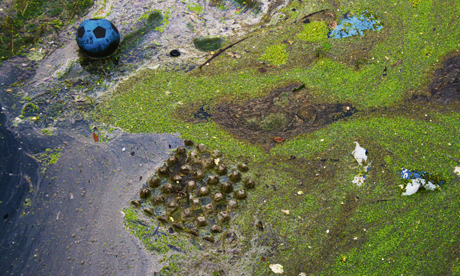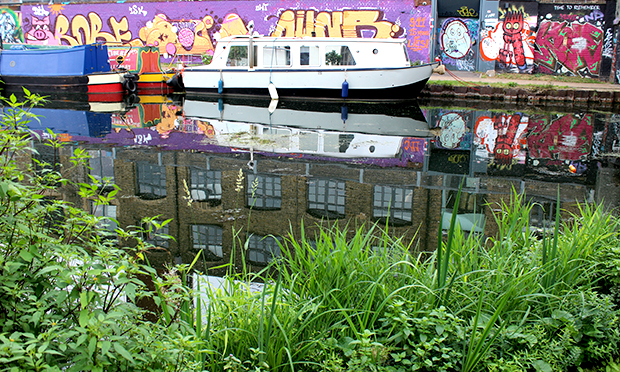Sewage flowed into East London’s Olympic Park wetlands six times during early summer heatwave

Raw sewage flowed from London’s drains into the Olympic Park wetlands six times over three days at the start of summer, the Citizen can reveal, as campaigners urge Thames Water to publish pollution data.
Water contaminated with faeces was fed into the River Lea for a total of 75 minutes on 1 May, 90 minutes on 6 June and 255 minutes on 18 June from Thames Water’s Mulberry Court Combined Sewage Overflow (CSO).
The same outlet discharged 91 times in 2019 and 20 times between January and April 2020 in incidents planned to release pressure on a sewer system overwhelmed by heavy rainfall and unflushable items like wet wipes.
Campaigners seeking to protect London’s waterways are now urging Thames Water to publish real-time alerts when the sewers discharge.
London Waterkeeper Theo Thomas said: “Thames Water knows when the sewer is overflowing, but the public does not. This is unacceptable in the 21st century.
“Downstream, you might have people kayaking or swimming in the river with sewage. If the information was online, people could make an informed judgement not to go into the river on a particular day.”
The River Lea is one of the most polluted waterways in the UK, with tampons, nappies and other waste items spotted frequently.
Research by University College London and Thames 21, a charity which advocates for London’s waterways and their users, shows the volume of faecal e-coli bacteria in the Lea regularly exceeds international standards.
Yet river users are often unaware of the impact.
Despite the prevalence of coronavirus, Londoners chose to cool off in the Lea at Hackney Marshes, which is upstream from Mulberry Court but downstream from Deephams Sewage Works and Enfield’s industrial estates, during May and June.
I’m told this was filmed at the River Lea, Hackney Marshes, yesterday. If it was, we’re screwed. pic.twitter.com/gouoEmWxXv
— Gabe Winn (@gabewinn) June 26, 2020
Mr Thomas said: “We have seen during the pandemic how green spaces and riversides are a frontline service: without them, it would have been so much harder. We have a right to use these places safely and we have the right to know what is being done to our environment.”
Since 2016, Thames Water’s £640 million Lee Tunnel has directed around 16 million tonnes of sewage each year which would otherwise have been discharged into the River Lea to Beckton sewage works, where it is treated.
The company does publish alerts for discharges at Hammersmith Pumping Station on the Thames but said it does not have resources to publish data from the monitoring technology at the Olympic Park.
A Thames Water spokesperson said: “We have invested heavily in monitoring equipment to understand how frequently spills are made to the environment, and to better target investment in the best solutions.
“We support standard advice which advocates the adoption of good hygiene practice for anyone undertaking activities on or in any river, irrespective of sewage discharges.”
They added: “We are looking into when we may be able to make [overflow data] available more easily online. We don’t currently have a timescale for when this will be achieved.”

Photograph: Max Eckersley
Water charity Thames21 urged individuals to check their homes for misconnected toilets and plumbing, which can mean household cleaners, toiletries and sewage end up in the water.
Debbie Leach, CEO of water charity Thames21 said: “Everyone has the right to enjoy a clean, healthy local river. Affected waterways cannot sustain wildlife and they look and smell unpleasant, so people are put off visiting them.”
Thames21, which is part of the River Trust Sewage campaign, believe installing more appropriately sited wetlands and sustainable drainage systems (SuDS), which slow and hold back water running of developments, could help tackle the problem.
Ms Leach said: “The more our cities are paved over in hard surfaces, the more rainfall can overwhelm the sewage system.”
She added: “We’d also like to see more regulation on wet wipes and encourage everyone to #bindontflush.”
To report pollution, call the Environment Agency on 0800 807060
